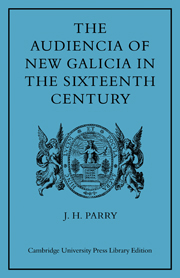Book contents
- Frontmatter
- Contents
- Preface
- List of abbreviations
- Introduction
- PART I THE SUBORDINATE AUDIENCIA, 1548–72
- CHAPTER I The Conquest of New Galicia
- Chapter II The Foundation of the Audiencia
- Chapter III The Audiencia and the Indians
- Chapter IV The Audiencia and the Conquistadores
- Chapter V The Audiencia and the Church
- Chapter VI The Reorganisation of the Audiencia, 1570–72
- PART II THE AUDIENCIA AND ROYAL CHANCELLERY, 1572–1600
- Conclusion
- Appendix A Specimen Title of Encomienda in New Galigia
- Appendix B Specimen Appointment of a Corregidor in New Galigia
- Index
- Plate section
Chapter III - The Audiencia and the Indians
Published online by Cambridge University Press: 07 October 2011
- Frontmatter
- Contents
- Preface
- List of abbreviations
- Introduction
- PART I THE SUBORDINATE AUDIENCIA, 1548–72
- CHAPTER I The Conquest of New Galicia
- Chapter II The Foundation of the Audiencia
- Chapter III The Audiencia and the Indians
- Chapter IV The Audiencia and the Conquistadores
- Chapter V The Audiencia and the Church
- Chapter VI The Reorganisation of the Audiencia, 1570–72
- PART II THE AUDIENCIA AND ROYAL CHANCELLERY, 1572–1600
- Conclusion
- Appendix A Specimen Title of Encomienda in New Galigia
- Appendix B Specimen Appointment of a Corregidor in New Galigia
- Index
- Plate section
Summary
The Spanish settlements in the New World could not survive without Indian labour; the Indians, accustomed to a life of communal subsistence farming, would not willingly work, even at a high wage, for an outside employer. Those were the hard facts which confronted the humanitarian reformer and the agent of royal paternalism. The colonial authorities were required to suppress the abuses of the encomienda, slavery and personal servitude, without infringing the rights of deserving conquerors and settlers; to ensure an adequate supply of hired labour for the Spanish settlements, while protecting the Indians in their possession of land, which relieved them of the necessity of working for wages. The task was an impossible one. The ultimate solution lay in the disappearance of the Indian holdings, the ubiquitous growth of capitalist haciendas, and the reduction of the Indian, by the process of debtslavery, to the condition of a landless peón. These developments lay in the future; in the sixteenth century the Crown and the audiencias strove continually to enforce the principle that the peaceful Indian retained his land and freedom according to his ancient customs, even if he lived within an encomienda grant; and that Spanish claims upon him were limited and might be defined by law.
Indian custom, however, admitted various forms of landholding and different degrees of personal freedom; and among the widely various tribes of New Spain there was naturally a corresponding variety of custom. In describing the ancient Mexicans and the sedentary peoples related to them some rough generalisation is possible.
- Type
- Chapter
- Information
- The Audiencia of New Galicia in the Sixteenth CenturyA Study in Spanish Colonial Government, pp. 55 - 83Publisher: Cambridge University PressPrint publication year: 1969



